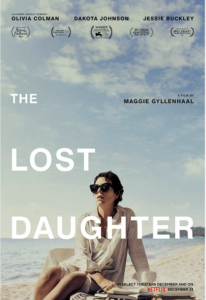 “The Lost Daughter by Maggie Gyllenhaal is a 2021 film adaptation of the 2006 Elena Ferrante novel of the same name. The novel’s protagonist, Leda, is an Italian woman who works as an English Literature professor. Since the film is in English, Gyllenhaal decides to make some setting changes, and Leda becomes a professor working on Italian Literature instead in the film. For this reason, in a scene from the movie, we can see Leda working on some texts, among which is Dante’s Comedy. The frame shows the books just for a few seconds, but it is clear that one of them is open on the first Canto of Paradiso. Even if shown just for a few seconds, the specific text in Leda’s book is significant in connection to the whole movie. The insertion of Dante in the film is both the consequence of the adaptation of the book in a foreign setting and an homage from the director to Ferrante and the whole Italian literary tradition.” –Contributor Martina Franzini
“The Lost Daughter by Maggie Gyllenhaal is a 2021 film adaptation of the 2006 Elena Ferrante novel of the same name. The novel’s protagonist, Leda, is an Italian woman who works as an English Literature professor. Since the film is in English, Gyllenhaal decides to make some setting changes, and Leda becomes a professor working on Italian Literature instead in the film. For this reason, in a scene from the movie, we can see Leda working on some texts, among which is Dante’s Comedy. The frame shows the books just for a few seconds, but it is clear that one of them is open on the first Canto of Paradiso. Even if shown just for a few seconds, the specific text in Leda’s book is significant in connection to the whole movie. The insertion of Dante in the film is both the consequence of the adaptation of the book in a foreign setting and an homage from the director to Ferrante and the whole Italian literary tradition.” –Contributor Martina Franzini
Contributed by Martina Franzini, Johns Hopkins University




